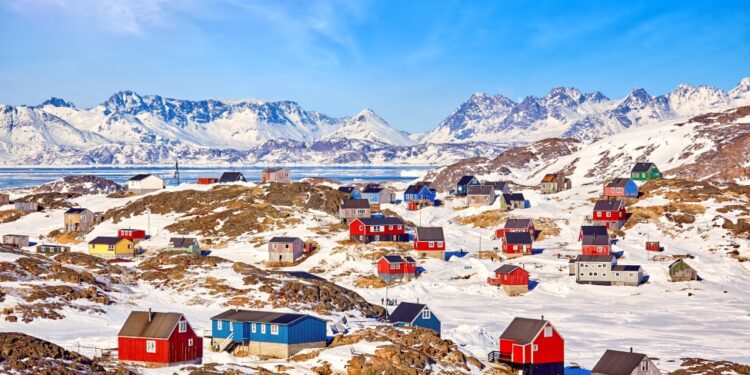By Monica Johnson, International Banker
┬а
тАЬIтАЩm not gonna commit to that. No. It might be that youтАЩll have to do something,тАЭ Donald Trump told reporters on January 7тАФjust a couple of weeks before being officially inaugurated as US presidentтАФwhen asked if he would rule out using military force to take control of Greenland. тАЬI canтАЩt assure youтАФyouтАЩre talking about Panama and GreenlandтАФno, I canтАЩt assure you on either of those two. But I can say this: We need them for economic security.тАЭ With such a posture demonstrating TrumpтАЩs nakedly aggressive ambition to acquire the Arctic island, the geopolitical and economic implications of pursuing such a provocative strategy could be seismic.
Before and since taking office for his second term, Trump has made frequent statements about the US acquiring the worldтАЩs largest island, with an area of 2.166 million square kilometres and a population of less than 57,000, all of whomтАФalong with the people of metropolitan Denmark and the Faroe IslandsтАФare full citizens of the Kingdom of Denmark. Geographically, the island is considered part of North America rather than Europe. Although Greenland was a Danish colony until 1953, it is now a self-governing jurisdiction with its own parliamentтАФwhilst remaining a territory of Denmark and with its foreign and defence policies under CopenhagenтАЩs control.
Despite commanding such a large chunk of global real estate, Greenland rarely garners news headlinesтАФthat is, until now. With the new US administration keen to advance its seemingly imperialist footprint beyond its borders in areas such as Gaza and Panama, Greenland has become an indisputable target of the Trump regimeтАФand the federal government may have sufficient Republican backing in Congress to advance those interests. тАЬWell, we need Greenland for national security purposes,тАЭ Trump said on January 7. тАЬPeople really donтАЩt even know if Denmark has any legal right to it. But if they do, they should give it up because we need it for national securityтАФthatтАЩs for the free world.тАЭ
Five days before being officially inaugurated, Donald Trump held a reportedly contentious telephone conversation with DenmarkтАЩs Prime Minister Mette Frederiksen, in which the US president reiterated his desire to acquire Greenland. According to an official readout of the discussion, Ms. Frederiksen cited the insistence of GreenlandтАЩs prime minister, M├║te B. Egede, that Greenland is not for sale and that тАЬit is up to Greenland itself to make a decision on independenceтАЭ.
Although TrumpтАЩs vociferous impulses might be alarming to many, the history of the USтАЩ attempts to acquire Greenland stretches back more than a hundred years. After acquiring Alaska from Russia for $7.2 million in 1867, which advanced access to the Pacific Ocean and pushed back against British influence in the region, the US proposed buying both Greenland and neighbouring Iceland from Denmark at a time when it was vulnerable due to its defeat against Prussia in the Second Schleswig War in 1864. And while negotiations did advance somewhat, the proposal failed to win sufficient approval from the U.S. Congress. A further attempt to explore GreenlandтАЩs acquisition was made during the 1910s when the USтАЩ interest in the ArcticтАЩs mineral resources was rising, but the outbreak of the First World War put an end to that proposal.
With Germany expanding its naval coverage around Greenland during the Second World War, along with reported attempts to establish weather stations on the island, the United States sought to expand its zone of neutrality to encompass Greenland. This eventually facilitated an agreement with Denmark to maintain a military presence on the island, which has lasted until today. As such, Greenland has for centuries represented something of a geopolitical battleground that the US has often cited as being crucial for its national security.
Although тАЬnational securityтАЭ is TrumpтАЩs stated reason for the USтАЩ interest in the territory on this occasion, it is also clear that GreenlandтАЩs mineral wealth is substantial. And at a time when American influence in traditional strongholds such as West Asia is dramatically waning, the opportunity to expand its resource-extraction footprint in other parts of the world is perhaps too enticing to pass up. Indeed, the establishment of a US consulate in GreenlandтАЩs capital city, Nuuk, in 2019 for the first time is evidence to many that the US is stepping up its commercial mining interests on the island at a time when climate change is melting ice sheets and thus improving accessibility to valuable minerals.
тАЬWeтАЩre definitely working on minerals here,тАЭ Joanie Simon, a member of the U.S. Embassy, explained to Foreign Policymagazine in December 2022. тАЬThe State Department has, for example, provided expert, independent advisory consultants to the ministry of mineral resourcesтАжto do things like modernize the data systems and get a better understanding of what kind of minerals there are here and chart [a] pathway to market for those minerals, hopefully, to draw in really excellent investors so that Greenland can achieve its goal of being a key in the green transition.тАЭ
ChinaтАЩs command of the rare-earth minerals market┬аmay also be prompting the US to expedite its interests on the island. Such minerals, which are essential components of smartphones, electric vehicles, smart televisions, a range of military applications and many more modern applications, are abundantly found in GreenlandтАЩs territory. But with the global supply of rare-earth minerals still dominated by Chinese miners, the US may well see Greenland as an opportunity to diversify its exposure to this crucial market and even seize a share of the market from China.
тАЬThe US increasingly sees ChinaтАЩs rise as a zero-sum process, in which every additional increment of advantage that China gets comes at the expense of the United States,тАЭ Eyck Freymann, author of the book One Belt One Road: Chinese Power Meets the World, told Foreign Policy in December 2022, adding that the USтАЩ interest in Greenland was less about access to rare-earth minerals and more about preventing China from gaining influence. тАЬThe US is not just afraid of having Chinese ships sailing around in the regionтАж. It also really doesnтАЩt like the idea that Greenland could tip over to become a Chinese proxy.тАЭ
According to James Patton Rogers, a historian of technology and war and the executive director of the Brooks Tech Policy Institute (TPI) at Cornell University, and Caroline Kennedy-Pipe, an expert in Arctic security and professor of war studies at the UKтАЩs Loughborough University, however, Trump will run up against key roadblocks during his acquisitional pursuits. тАЬHe seems well on his way to getting domestic support for buying Greenland thanks to his dominance of the GOP and the legitimate security concerns posed by Moscow and Beijing,тАЭ Rogers and Kennedy-Pipe wrote in a January 23 article for Time magazine. тАЬYet, unlike in previous cases, the Danes have no interest in accommodating him. A combination of Danish pride and the inclusion of the Indigenous community of Greenland in decision-making, after decades of neglect, make this different from 1867 with Alaska, or even the World War II moves by the US to gain a defence foothold in Greenland.тАЭ
Whether Trump continues down this path remains to be seen. Nonetheless, some are treating the threat of US encroachment as not insignificant. тАЬI was told that Trump is quite serious about Greenland, and itтАЩs going to be a huge challenge for the EU if we donтАЩt react strongly to it,тАЭ Zaki La├пdi, a professor at Sciences Po and an adviser to the former European Union foreign-policy chief Josep Borrell Fontelles, told the New York Times, adding that тАЬthe Danes are saying, тАШKeep it down,тАЩ but theyтАЩre scared.тАЭ
Indeed, Egede has called for early elections to be held on March 11 as a direct consequence of the escalating geopolitical tensions that have arisen. тАЬItтАЩs time for an election to the Inatsisartut [Greenlandic Parliament]. If the Inatsisartut approves my proposal, this will happen on March 11th,тАЭ Egede posted on Facebook. тАЬWe are in a serious time. A time we have never experienced in our country. The time is not for internal division but for cooperation and unity for our country. I am once again more than ready to work for you and to lead our country.тАЭ
The Parliament of Greenland passed a bill on February 4 banning foreign or anonymous funding of political parties, again a move deemed a direct response to TrumpтАЩs wishes to take over the island. The bill, which protects тАЬGreenlandтАЩs political integrityтАЭ and came into immediate effect, тАЬmust be seen in light of the geopolitical interests in Greenland and the current situation where representatives of an allied great power have expressed interest in taking over and controlling GreenlandтАЭ, the official wording of the legislation stated.
In January, Egede also announced an intention to gain independence from Denmark. тАЬThe Greenlandic peopleтАЩs opportunity for independence has been adopted through the provisions of the Self-Government Act, thereby creating a legal basis for how independence can be achieved,тАЭ Egede explained.
┬а
Source link : http://www.bing.com/news/apiclick.aspx?ref=FexRss&aid=&tid=67b691c3a7374950b80c5f718f7ebfa6&url=https%3A%2F%2Finternationalbanker.com%2Ffinance%2Ftrump-wants-to-buy-greenland-what-are-the-implications%2F&c=15411026596285162189&mkt=en-us
Author :
Publish date : 2025-02-18 21:50:00
Copyright for syndicated content belongs to the linked Source.












